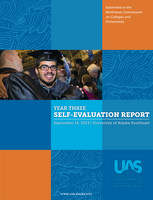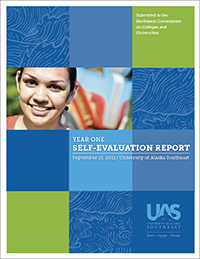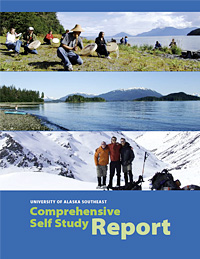Accreditation
The University of Alaska southeast has been accredited by the Northwest Commission on Colleges and Universities (NWCCU) since 1983. This accreditation includes the Juneau, Ketchikan, and Sitka campuses.
Institutional accreditation is regularly reviewed and reaffirmed by the NWCCU. This reaffirmation focuses on a process of continuous improvement. Such improvement aligned with standards occurs through regular reports and site visits conducted by peer evaluators. In addition to these reports and visits, the institution also communicates regularly with the NWCCU about substantive program changes including additions, suspensions, and deletions as well as about changes to institutional leaders and organizational structure.
At UAS, the Provost serves as the Accreditation Liaison Officer (ALO) and is the primary point of contact for information regarding accreditation. The provost's office can be contacted at 907-796-6256 or uas.provost@alaska.edu.
Year 7 - Mission Fulfillment and Sustainability - Reaffirmation of UAS Accreditation - July 2019.
The University of Alaska Southeast is accredited by the Northwest Commission on Colleges and Universities.
Accreditation of an institution of higher education by the Northwest Commission on Colleges and Universities indicates that it meets or exceeds criteria for the assessment of institutional quality evaluated through a peer review process. An accredited college or university is one which has available the necessary resources to achieve its stated purposes through appropriate educational programs, is substantially doing so, and gives reasonable evidence that it will continue to do so in the foreseeable future. Institutional integrity is also addressed through accreditation.
Accreditation by the Northwest Commission on Colleges and Universities is not partial but applies to the institution as a whole. As such, it is not a guarantee of every course or program offered, or the competence of individual graduates. Rather, it provides reasonable assurance about the quality of opportunities available to students who attend the institution.
Inquiries regarding an institution’s accredited status by the Northwest Commission on Colleges and Universities should be directed to the administrative staff of the institution. Individuals may also contact:
Northwest Commission on Colleges and Universities
8060 165th Avenue N.E., Suite 100
Redmond, WA 98052 (425) 558-4224 www.nwccu.org
Accreditation by the Northwest Commission on Colleges and Universities refers to the institution as a whole. Therefore, statements like “fully accredited” or “this program is accredited by the Northwest Commission on Colleges and Universities” or “this degree is accredited by the Northwest Commission on Colleges and Universities” are incorrect and should not be used.
NWCCU Public Notice Statement: The University of Alaska Southeast is accredited by the Northwest Commission on Colleges and Universities (NWCCU) to ensure institutional quality and integrity. UAS’s accreditation status is Accreditation Reaffirmed.
Every seven years, NWCCU conducts an ‘Evaluation of Institutional Effectiveness’–an in-depth review and site visit to evaluate UAS’s ongoing effectiveness in meeting accreditation standards and fulfilling its mission through continuous improvement. Accreditation applies to the university as a whole (rather than to individual campuses or programs), ensuring adequate opportunities for students who enroll.
The most recent evaluation of this kind took place in April 2019, and NWCCU’s action on the institution’s accreditation status was to reaffirm accreditation on July 12, 2019. The next evaluation is scheduled for 2026, with a peer evaluation team site visit on April 15-17, 2026.
The public is invited to send comments to the NWCCU in advance of this visit via the electronic submission form: https://nwccu.org/member-institutions/upcoming-evaluations/ or by mailing them to: Northwest Commission on Colleges and Universities, 8060 165th Ave NE, Suite 200, Redmond, WA 98052. The commission office will accept third-party comments up to ten days before the start date of the evaluation visit (by April 5, 2026).
UAS's Current Cycle
UAS’s current accreditation cycle includes the following milestones:
- Spring 2026: Evaluation of Institutional Effectiveness (EIE – Year Seven, Report and Visit)
- Spring 2025: Policies, Regulations, and Financial Review (PRFR – Year Six, Report and Review)
- Spring 2022: Mid-Cycle Evaluation (Year Three, Report and Visit)
Using the results of the 2019 comprehensive review and site visit, UAS is building capacity to fulfill its distinctive mission as a student-centered university that provides instruction in liberal arts, professional, and technical fields. On the homelands of the Tlingit, Haida, and Tsimshian peoples, UAS serves the coastal environments, cultures, economies, and communities of Alaska through interdisciplinary education, workforce development, and scholarship, research, and creative activity.
UAS continues to build on the strengths noted by NWCCU in five commendations. These are:
- The recognition and inclusion of Alaska Native language, art, history and individuals into its buildings, curriculum, and administration. The involvement of Elders and culture-bearers has created an extremely important connection between the Alaskan Native community and UAS’s goal to be a place of cultural safety and equity.
- Robust participation in the accreditation process by faculty, staff, and students.
- Efforts and commitment to student retention and student success, particularly the efforts and commitment of the Student Success Committee. The creation of the Strategic Enrollment Plan and identification of student barriers of access is enabling a more efficient and operational framework to measure student needs and achievement.
- Optimizing distance education opportunities across a vast geographical area. Students have access to strong programs of study and student services that support their educational goals. Additionally, students on all UAS campuses are provided with meaningful experiential learning opportunities in a variety of community-based settings.
- Success at integrating three campus locations into one university with shared vision and values. The level of collaboration and consistent support among the three campuses is remarkable.
The new NWCCU Standards and Eligibility Requirements, with their focus on student learning, student success, and achievement, reinforce UAS’s efforts in these areas.
2019 Report
Our Year Seven Self-Evaluation report is now available online.
A site visit by a team of Northwest Commission on Colleges and Universities (NWCCU) evaluators occurred April 24-26, 2019.
The NWCCU votes on UAS accreditation status June 19-20, 2019.
Accreditation Reaffirmation - July 2019.

UAS 2013 Year Three Self Evaluation Report
Below are the table of contents for the 2013 Year Three Self Evaluation Report. Below is a list of bookmarks for navigation within the PDF document above.
Helpful Links

UAS 2011 Year One Self Evaluation Report
Below are the table of contents for the 2011 Year One Self Evaluation Report. (5.1Mb). There is an extensive list of bookmarks for navigation within the PDF document above. To read the NWCCU's response to the 2011 Self Study Report, click here.

UAS 2009 Self Study Report
Below are the table of contents for the 2009 Self Study Report. (1.8Mb). There is an extensive list of bookmarks for navigation within the PDF document above. To read the NWCCU's response to the 2009 Self Study Report, click here.
UAS Accreditation Committees
UAS Accreditation Advisory Committee for Evaluation of Institutional Effectiveness (EIE)
Carin D. Silkaitis, M.F.A.
Dean of Arts and Sciences; Professor of Humanities
Kristen Handley, M.S.
Institutional Effectiveness Director
Lori A. Klein, M.S.
Vice Chancellor for Enrollment Management and Student Affairs
Carlee Simon, Ph.D.
Dean of Education
Alison K. Staudinger, Ph.D.
Associate Dean of Arts & Sciences
William Urquhart, Ph.D.
Ketchikan Campus Director / Professor of Sociology
Jeremy Rupp, Ed.D.
Sitka Campus Director
Kristy D. Smith, D.M.
MPA Program Coordinator, Associate Professor of Management, Business and Public Administration Department Chair
Abi Spofford, B.A.
Chief of Staff
UAS Accreditation Advisory Committee for Policies, Regulations, and Financial Review (PRFR)
Carin D. Silkaitis, M.F.A.
Dean of Arts and Sciences; Professor of Humanities
Kristen Handley, M.S.
Institutional Effectiveness Director
Terissia Bell, MHIIM, B.B.A., RHIA, CIC, COC, CPC
Associate Professor and Program Director of HIM
Louisa Cryan
Director of Business Services
Lori A. Klein, M.S.
Vice Chancellor for Enrollment Management and Student Affairs
Paul Kraft, Ph.D.
Sitka Campus Director
Jon Lasinski, M.B.A.
Vice Chancellor for Administrative Services
Nathan C. Leigh
Director, Facilities Services
Mona Mametsuka, B.B.A.
Information Systems Manager
Cory Ortiz, Ph.D.
Dean of Career & Technical Education
Anita H. Parrish
Faculty & Academic Affairs Coordinator | Assistant to the Provost
Carlee Simon, Ph.D.
Dean of Education
Kristy D. Smith, D.M.
MPA Program Coordinator, Associate Professor of Management, Business and Public Administration Department Chair
Alison K. Staudinger, Ph.D.
Associate Dean of Arts & Sciences
Mark Thompson
Infrastructure Manager
Elise Tomlinson, M.P.A., M.L.I.S.
UAS Library Dean, including the Learning, Testing, & Writing Centers, & the Center for Excellence in Learning & Teaching (CELT)
William Urquhart, Ph.D.
Ketchikan Campus Director / Professor of Sociology
Jennifer Ward, M.L.I.S.
Professor of Library and Information Science, Outreach Services Librarian